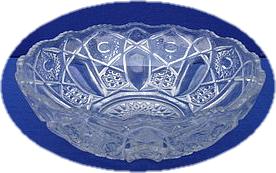National Depression Glass Association
Preserving America's Glass Manufacturing Heritage
The McKee Glass Company - Part II
by Sandra McPhee Stout
Rainbow Review Glass Journal - October 1972
This month, part two of the history is continued: - After the death of Mr. Andrew Jackson Smith in 1924, his son Maurice A. Smith, who previously had been Vice President, was elected to the Presidency. The other son, Donald M. Smith, who had previously been Second Vice President, moved up to the Vice Presidency, until his brother Maurice died in 1940, and then Donald M. Smith was elected to the Presidency.
Maurice A. Smith and Donald M. Smith were groomed for the
eventual presidency by their father, and were always aware of
leadership and  other traits which were necessary for such a
position. In the patent office search, many, many patents were
granted to Maurice A. Smith, assignor to the McKee Glass Company.
The line that made McKee famous was the Prescut Line. The Prescut
line had many patterns therein, each piece resembles, as the name
implies, pressed glassware, appearing quite like cut-ware, deep and
heavy, but pressed. An example appears in the photo at right. Each
piece bears the trademark on the bottom, in raised relief, PRESCUT.
The Prescut lines are long and the patterns many. In my book The
Complete Book of McKee Glass, I believe approximately 150 pages
or more are devoted just to this line. The company issued new
patterns, and they always met with success, therefore the lines
were continued the same year after year, the only difference being
they perhaps added or deleted an item within the line.
other traits which were necessary for such a
position. In the patent office search, many, many patents were
granted to Maurice A. Smith, assignor to the McKee Glass Company.
The line that made McKee famous was the Prescut Line. The Prescut
line had many patterns therein, each piece resembles, as the name
implies, pressed glassware, appearing quite like cut-ware, deep and
heavy, but pressed. An example appears in the photo at right. Each
piece bears the trademark on the bottom, in raised relief, PRESCUT.
The Prescut lines are long and the patterns many. In my book The
Complete Book of McKee Glass, I believe approximately 150 pages
or more are devoted just to this line. The company issued new
patterns, and they always met with success, therefore the lines
were continued the same year after year, the only difference being
they perhaps added or deleted an item within the line.
Most prescut patterns were introduced prior to 191O, the majority being placed on the market around 1906 to 1908. The catalogues of 1927 still retained all but two major lines. A major line is a line that has several items at least, all the way to over 50 plus. Some lines only had one item. Carrying all but two of the major lines, some since the 1901 era, is a long time. The prescut patterns continued for a few years more before they were finally discontinued due to matters of economics and the public taste which is fickle and always changing.
Webmaster's Note: The third installment of this article was delayed from the November 1972 issue, and was to be printed in a later issue. Unfortunately, we don't have that issue, so the story ends abruptly here.